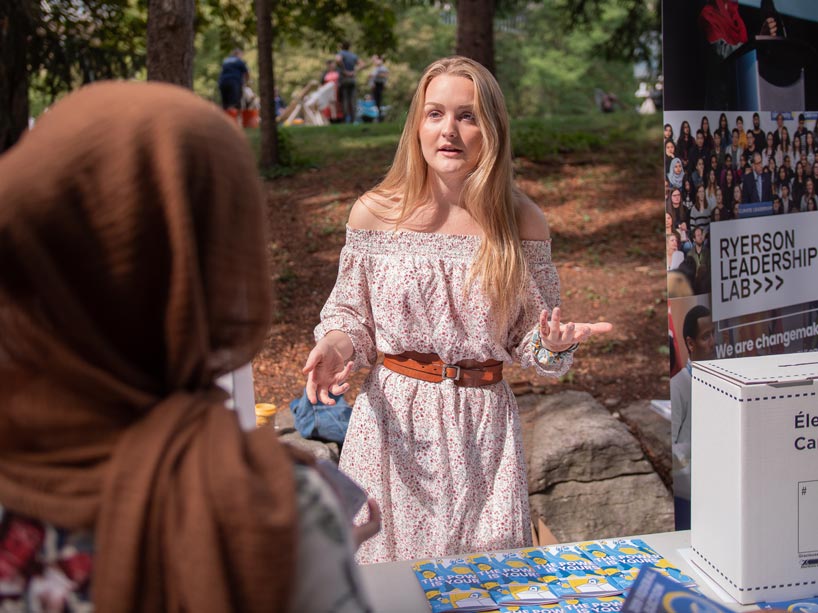Getting the youth vote out

Taylor Deasley (centre), a third-year student in political science, speaks to a student at one of the many vote pop-up booths she has helped organize on campus since Orientation Week. Photo credit: Nikita Ovsyannikov.
With the federal election less than a month away, students, faculty and staff may be thinking about the issues that are important to them and which party they should support.
But for many people, particularly those who are voting for the first time, or who don’t vote very often, the process can be very confusing, or even overwhelming. So many end up simply not showing up at the ballot box.
Taylor Deasley and Aysha Anwar are hoping to change this. The two undergraduate students are leading a non-partisan voter engagement campaign – Ryerson VOTES – to educate the Ryerson community, in particular students, on the voting process and encourage them to vote.
Students, faculty and staff can vote in advance on campus from Oct. 5 to 9 at the Student Campus Centre. The on-campus polling station allows people to vote no matter where their riding is based in Canada. In addition, voters can vote in their riding at advance polling stations (Oct. 11 to 14) as well as on Election Day (Oct. 21).
For many undergraduate students, this will be the first time they will be voting in a federal election.
“People are interested [in voting] but don’t realize it’s ok to be confused,” says Deasley, a third-year political science student who comes from a family who always has been politically engaged. “We’re trying to make it a less intimidating experience for the students.”
Anwar, a third-year student in professional communications, points out that millennials will make up the largest portion of eligible voters this election, which is why it’s important to encourage as many Ryerson students to get engaged and vote. “Students have issues they care about and issues that impact them. They are the leaders of today so engagement allows them to make real change.”
Ryerson VOTES has been working with student groups on campus to hold pop-up voting booths at various events since late August. They have also trained over 20 student volunteers to run vote pop-up booths every day at different locations on campus until the day before the election. Armed with education materials from Elections Canada, including an official voting screen and ballot box, the students explain to their peers how the voting process works and answer their questions. Their goal? For 10,000 students on campus to vote.
Ryerson VOTES is part of a national voter engagement campaign that is being organized and led by the Faculty of Arts’ Democratic Engagement Exchange.
Together, the Democratic Engagement Exchange and Apathy is Boring (external link) , a non-partisan organization that encourages youth democratic engagement, are leading in what is billed as the largest non-partisan voter engagement campaign in Canadian history.
Named the Canadian Vote Coalition and funded by Elections Canada and Heritage Canada, the campaign aims to engage one million voters in this fall’s federal election, mobilize hundreds of community-based organizations and local leaders and inspire 2,000 vote pop-ups across the country.
So far, over 650 national and local organizations have joined the coalition including YWCA Canada, the Toronto Public Library, Canadian Muslim Vote and Samara Centre for Democracy to engage and educate their communities on the importance of voting.
The organizers have also completed 20 in-person training workshops with community-based organizations and local leaders across the country, from Halifax to Vancouver. Field organizers have been hired in eight regions to provide support to these local organizations.
In addition 50,000 federal election (PDF file) handbooks (external link) are being distributed to inform people on the voting process, provide reliable information on Canada’s parties, educate people on engaging on issues important to them and identify what is “fake news”.
This voting toolkit was developed by the Democratic Engagement Exchange based on research findings released by the Ryerson Leadership Lab (external link) ’s Rebuilding the Public Square report (external link) earlier this month.
“We and our community partners believe that a healthy democracy is key to driving all of the issues that are important to Canadians, whether it’s housing affordability, environmental issues or transit,” says John Beebe, senior advisor at the exchange. “This is the first time that there is a unified effort by community-based organizations from coast to coast who are participating in non-partisan voter engagement.”
Beebe adds that the youth vote, which has been historically low, is extremely important. “It’s critical for students to get engaged in this election so their voice is heard. Their vote is one of the most powerful tools to make sure their dreams and aspirations are heard by all parties.”
Deasley, who is voting for the first time in a federal election, agrees.
"When you vote, it's so much more than simply putting a ballot in a box. Voting is about informing your country about the issues that matter to you. Your vote tells Canada that you have something to say, and that you're worth listening to. Now that's quite powerful."